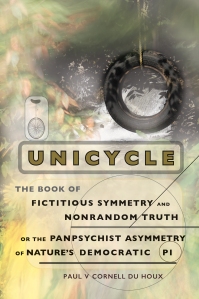Yoganomics Sutras on the Transformation Proof: Nature’s Panpsychist Balance, the Moral Compass for the Economy (5th edition, March 2024)
Fifth edition, March, 2024
Sherman’s Maine Coast Book Shops
“They act like firecrackers in your intellectual reading consciousness.”
“As explained [in the afterword] ‘Cornell du Houx “developed a math that lets us read the ethics of natural law within the environment.”’ This is a not inaccurate, but incomplete summary of Yoganomics’s subject matter, which skates an enormous range of philosophical material. [The] afterword characterizes the contents as having ‘the ancient and succinct style of the sutra,’ indicating the sort of gonglike presence . . . that clearly underpins its ideas. For like a sutra, the text consists of numbered sentences . . . some of which have a vatic quality, others plainly conversational. They cover quantum physics, mathematics and pi; politics; various real and figurative modes of addiction; gender; the perils of climate change; the Tao; communist China; Plato; ranked-choice voting; and many more subjects, with recurring focal points involving socioeconomics, nature, environmental degradation, and the dangers of ‘absolutes’ in everyday thinking.”
—Dana Wilde, Morning Sentinel, Kennebec Journal, author of Nebulae: A Backyard Cosmography and The Other End of the Driveway
Catching Up, July 2020
This blog has lain fallow. It’s been over eight years since I posted the text below the line at the end of this update on Yoganomics. Having decided it was just an experiment of my late twenties, I’ve since reconsidered and rewritten the book — forty years later. To say “reconsider” means crediting my wife, Ramona, who reminded me that the original attempt had been worthwhile — to find nature’s moral compass for the economy — now more than ever. And, she added, if I didn’t fix it, the ideas contained, some of them wild enough already, might become feral. Reluctantly, in my late sixties, I had a look at what I had written, back in the late seventies, wondering if it was now altogether too late already. It is difficult to know to what extent one is the product of one’s time and place, how culture-bound one might be, and to what extent one has got free. Ideas I had discarded with that book as foolish now showed up in retrospective context as not only foolish but entrenched, going back beyond the spontaneous regeneration of “self-righting” markets even unto the ancient Wu wei of “effortless action,” or what I had subtitled “pure motion.” Money “just happens.” That said, there is more to Wu wei than the many facile interpretations, not that mine was even conscious. So I was part of something greater, a bigger fool than I even thought, though strangely comforted not to be alone. So I set about making amends with the tools well honed (say I) in Unicycle, the Book of Fictitious Symmetry and Nonrandom Truth, or the Panpsychist Asymmetry of Nature’s Democratic Pi. Yoganomics, the book, might even provide an introduction, a warning in 370 sutras to approach your unicycle with care, especially, like me, if you knew that already.
April 2012 post:
Googling “yoganomics,” there are more and more pages, some with elaborate sites and registered trade marks that are not mine. I am owning up here to having written a book entitled Yoganomics, back in 1979. When a few years later the word “Reaganomics” was being bandied about, I was taken aback. Economics had not yet achieved such humanizing syllables, which would be reconfigured again and again. Obamanomics has got to be the best. Reaganomics was certainly a coincidence, anyway; Yoganomics was still unpublished, back then. In a way I wish it still were. I got it backwards. But it did help me to organize my thoughts.
At Amherst College I had become interested in how the narrow parameters of the economics I was studying seemed to be particularly Western, and I began to look for other cultural values that might highlight new opportunities to view the field. I took some courses and read up on some aspects of the East.
After graduation, my first real job was as an auditor with what was then Price Waterhouse & Co., UK, at the south end of London Bridge. I studied contract law and wondered just when and how a price was really agreed. I got a closer feel for that elusive “elasticity” (or inelasticity) of the intersecting demand and supply curves when I joined the marketing team of the French computer manufacturer, Logabax. Yoganomics was basically just a list — a cascade — of ideas gathered to date, in the summer of ’79.
Since college I had become increasingly impressed by Yoga, especially from the day I stubbed out my last cigarette and never felt the slightest desire for another. After all the years of fighting this addiction, embracing it, and fighting it again, it just stopped. There is of course a smoking story that goes with this event, but not here; fact is, the more I looked for a reason for what seemed a miracle, the more the idea of “substituting behavior” or “changing life style” seemed a likely explanation. Even so, I’m not much of a yogi; shamefully, perhaps, I took what yoga had to offer and ran. I do run back now and then and combine it with other exercises and then Mediterranean food.

So I just wanted to ramble on a bit about yoganomics, since it seems to proliferate, and I don’t know any of the folks involved in whatever has become of the word. I hope they’ve got it the right way round. Hi folks :=) Also, the book, long out of print, sometimes shows up with Unicycle on the immortal Internet. Maybe I should write Yoganomics, the Prequel, and Yoganomics, the Sequel. But when I figured out that the premise of Yoganomics was backwards, I was finally on the road, with Unicycle. Yoganomics inadvertently highlighted our predilection for the paradox of absolutes. Unicycle provides a new solution to an ancient conundrum that is afflicting us today.
One more thing. Yoganomics: Pure Motion and the Law of Economic Erosion was eventually published with illustrations by Justin Williams. The artwork made it all worthwhile. I highly recommend Logicomix, btw, where the comic book idea as applied to an intellectual subject succeeds beyond all absolutes.




